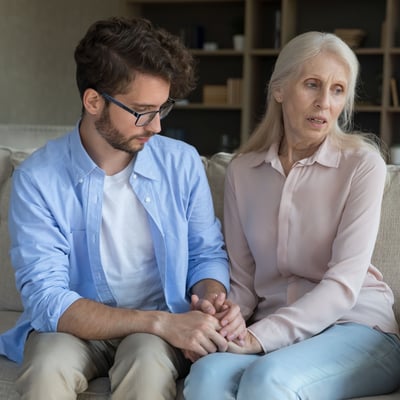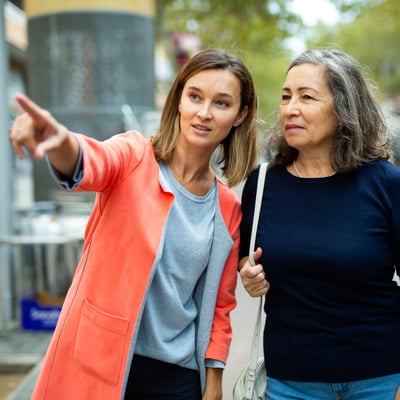We've unlocked the Premium Features for this special episode! Members get access to features just like this across our entire library. Learn More
Please request our permission before redistributing these files.
- Anabela: Estou? Anabela: Hello? (answering the phone)
- Filipe: Olá Anabela! Daqui é o Filipe. Filipe: Hello Anabela! This is Filipe.
- Anabela: Como é que estás? Anabela: How are you?
- Filipe: Está tudo bem. E tu? Filipe: Everything's fine. And you?
- Anabela: Também estou bem, obrigada. Anabela: I'm fine too, thanks.
- Filipe: Estou a ligar-te para saber se queres sair comigo? Filipe: I'm calling you to see if you want to go out with me?
- Anabela: Pode ser. Também estava a pensar nisso. Anabela: Sure. I was thinking about that too.
- Filipe: O que é que achas de irmos ao cinema? Filipe: What do you think about going to the cinema?
- Anabela: É uma boa ideia! Anabela: It's a good idea!
- Filipe: Ouvi dizer que estreou um novo filme do Star Wars, queres ir ver? Filipe: I heard that the new Star Wars movie premiered. Do you want to go see [it]?
- Anabela: Sim. Gosto muito dos filmes Star Wars. Quando é que vamos? Anabela: Yes. I really like Star Wars movies. When will we go?
- Filipe: Queres ir amanhã à tarde? Filipe: Do you want to go tomorrow afternoon?
- Anabela: Pode ser. E vamos a que cinema? Anabela: Sure. And what cinema are we going to?
- Filipe: Podemos ir ao Centro Comercial Colombo. Filipe: We can go to Colombo Shopping Center.
- Anabela: Sim. Depois podemos ir comer alguma coisa. Anabela: Yes. Afterwards we can go eat something.
- Filipe: Onde é que nos encontramos? Filipe: Where will we meet?
- Anabela: Podemos encontrar-nos no café do Rossio. Anabela: We can meet at Rossio's cafe.
- Filipe: Pode ser. Assim podemos apanhar o metro para o Colombo. Filipe: Sure. That way we can take the metro to Colombo.
- Anabela: Sim. E a que horas é que nos encontramos? Anabela: Yes. And at what time do we meet?
- Filipe: É melhor encontrarmo-nos depois do almoço, pois a matiné começa por volta das 16 horas. Filipe: We better meet after lunch, because the matinée starts around 16:00 (4 p.m.)
- Anabela: Sim, é melhor. Ainda podemos tomar uma bica antes de irmos. Anabela: Yes, it's better. We can still have a coffee before we go.
- Filipe: Claro! Filipe: Of course!
- Anabela: Fica combinado, Filipe. Anabela: It's a date (it's settled), Filipe.
- Filipe: Fico à tua espera amanhã. Filipe: I'll be waiting for you tomorrow.
- Anabela: Até amanhã. Adeus. Anabela: See you tomorrow. Bye.
- Filipe: Adeus. Filipe: Goodbye.
Onde é que o Filipe quer ir?
Ao café
Ao cinema
Ao teatro
De que filmes é que a Anabela gosta?
Harry Potter
Senhor dos Anéis
Star Wars
Quando é que eles tencionam ir ao cinema?
Amanhã à tarde
Hoje à tarde
No fim de semana
A que cinema é que eles vão?
Centro Comercial Colombo
Centro Comercial Vasco da Gama
Norte Shopping
O que é que a Anabela sugere fazer depois do cinema?
Comer qualquer coisa
Jogar bólingue
Caminhar
Como é que eles vão para o centro comercial?
De metro
De autocarro
De Uber
aindastill, yet, even alguma coisasomething o almoçolunch amanhãtomorrow a bicathe espresso regional term, spout encontrarto find, come across, meet estrearto debut, premiere, be released o filmemovie, film ligarto call on the phone, connect, turn on À tardeIn the afternoon
Expressions
Está tudo bemEverything is fine, All is well Fica combinadoIt's a deal Estou?Hello? in the context of answering the phone Fico à tua esperaI'll be waiting for you Por volta dearound a certain time Pode serSure, Okay, That’s fine 
 António A
António A Marina
Marina










Comments
Ok for first attempt
Great exercise. Nice and short! Obrigada
Is “Estou” the most common way of answering the phone in Portuguese ? It literally means “I am” ? Correct? So is it the equivalent of saying “Estou aqui” ?
Obrigada !
Susan
Yes, people usually say “Estou?” or “Estou sim?” when answering the phone. The translation is correct!
Sorry if this has appeared twice, my ipad is acting up. Thank you for this story, I now understand what Pt people are saying when they appear to say ‘tou’ on answering the phone. The ‘es’ gets swallowed so all you hear is tou, but now I get it. Muito obrigada
…..NO BRASIL DIZEMOS “TUDO BEM?” É UMA FORMA COLOQUIAL….. OU “LEGAL”…. SIGNIFICA A MESMA COISA QUE “ESTOU BEM!”….
on first listen I did not understand ‘meet after lunch’ and on reading it appears the speech is different to the words. I cannot hear ‘almoco’. Am I missing something?
Regards
Olá Dawn-Marie!
Maybe you were expecting to hear “al – mo – ço”, but when it’s said quickly and with a slightly different pronounciation it seems the last “o” is barely there. But I can assure you that he’s saying it right!
Cheers,
Luís
My difficulty with this exercise was the speed that the characters used in their speech. There were a few sentences that I listened to multiple times and couldn’t figure out what was being said. Take this one for example:
Ouvi dizer que estreou um novo filme
This was spoken in a very compressed/chopped manner and I couldn’t figure out exactly what was being said. There were several cases like this in this dialog, and even slowing down the playback didn’t help because of how the words are so strung together by the speakers.
I realize this is how a native Portuguese would say these expressions, but the exercises we do in the units are presented in a much slower/more clear fashion. I also listen to the native speaker clips of course but I find the audio quality of those clips a bit “difficult” at times and I frequently have to resort to the official clip to confirm. It might be useful to have a playback option like the “turtle” that plays the audio in “native” mode, similar to the clips of native speakers but done in a studio in the same manner as the official audio clips are made. I’d argue that the “native” mode clips should even be the default version.
This particular Shorty is listed as an A1 level dialog. Do these levels refer only to the level of the grammar being used or does it also refer to the speed of the dialog? This is often my downfall in these dialogs, not the grammar but the speed and clipped manner of speaking by the characters in the dialogs.
Olá Peter, thanks for sharing your feedback with us. I totally get what you mean about the dialogue being spoken quickly – especially since the speakers are from the north, it can definitely be a bit trickier to follow at times. But on the bright side, it’s helpful to familiarize ourselves with speakers from all over Portugal, instead of only the Lisbon area, since you’ll bump into natives from all over the country regardless of where you spend your time. On the other hand, if we had dialogues featuring speakers from São Miguel in the Azores, that would be even more of a challenge!
Regarding the level of the dialogue, I understand your point about the speed being an important factor. The learning levels we assign are always going to be a bit subjective since there are many factors to consider. While the spoken dialogue can be difficult to follow at times, the written grammar will always have a heavier weight on the scoring.
I hope that helps, and we’re always here when you have any other questions or feedback!
Thanks for the reply. Sadly, even after two years of studying Portuguese, I still can’t really carry on a conversation with a local. I can start a conversation, but most of the time I have to switch to English to carry on. I simply cannot understand spoken Portuguese here in the Algarve, not if it is anything involved. And my impression is that the locals can’t really understand my attempts at Portuguese either! I do much better in reading of course. Even if there are words that I don’t know, they’re often similar to English words so the meaning can usually be figured out.